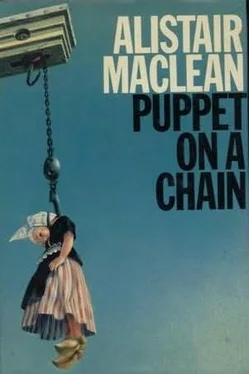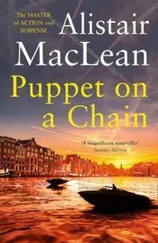My disguise, at the moment, seemed completely superfluous. Nobody looked at me as I entered and it was quite clear that nobody even wanted to look at me, which was understandable, perhaps, in the circumstances, as the audience were almost splitting their pebble glasses in their eagerness to miss none of the aesthetic nuances or symbolic significances of the original and thought-compelling ballet performance taking place before their enraptured eyes, in which a shapely young harridan in a bubble-bath, to the accompaniment of the discordant thumpings and asthmatic wheezings of an excruciating band that would not otherwise have been tolerated in a boiler factory, endeavoured to stretch out for a bath-towel that had been craftily placed about a yard beyond her reach. The air was electric with tension as the audience tried to figure out the very limited number of alternatives that were open to the unfortunate girl. I sat down at the table beside Belinda and gave her what, in the light of my new complexion, must have been a pretty dazzling smile. Belinda moved a rapid six inches away from me, lifting her nose a couple of inches higher in the air.
'Hoity-toity,' I said. Both girls turned to stare at me and I nodded towards the stage. 'Why doesn't one of you go and help her?'
There was a long pause, then Maggie said with great restraint: 'What on earth has happened to you?'
'I am in disguise. Keep your voice down.'
'But — but I phoned the hotel only two or three minutes ago,' Belinda said.
'And don't whisper either. Colonel de Graaf put me on to this place. She came straight back here?'
They nodded.
'And hasn't gone out again?'
'Not by the front door,' Maggie said.
'You tried to memorize the faces of the nuns as they came out? As I told you to?'
'We tried,' Maggie said.
'Notice anything odd, peculiar, out of the ordinary about any of them?'
'No, nothing. Except,' Belinda added brightly, 'that they seem to have very good-looking nuns in Amsterdam.'
'So Maggie has already told me. And that's all?'
They looked at each other, hesitating, then Maggie said: 'There was something funny. We seemed to see a lot more people going into that church than came out.'
'There were a lot more people in that church than came out,' Belinda said. 'I was there, you know.'
'I know,' I said patiently. 'What do you mean by "a lot"?'
'Well,' Belinda said defensively, 'a good few.'
'Ha! So now we're down to a good few. You both checked, of course, that the church was empty?'
It was Maggie's turn to be defensive. 'You told us to follow Astrid Lemay. We couldn't wait.'
'Has it occurred to you that some may have remained behind for private devotions? Or that maybe you're not very good counters?'
Belinda's mouth tightened angrily but Maggie put a hand on hers.
That's not fair, Major Sherman.' And this was Maggie talking. 'We may make mistakes, but that's not fair.' When Maggie talked like that, I listened.
'I'm sorry, Maggie. I'm sorry, Belinda. When cowards like me get worried they take it out on people who can't hit back.' They both at once gave me that sweetly sympathetic smile that would normally have had me climbing the walls, but which I found curiously affecting at that moment, maybe that brown stain had done something to my nervous system. 'God only knows I make more mistakes than you do.' I did, and I was making one of my biggest then: I should have listened more closely to what the girls were saying.
'And now?' Maggie asked.
'Yes, what do we do now?' Belinda said.
I was clearly forgiven. 'Circulate around the night-clubs hereabouts. Heaven knows there's no shortage of them. See if you can recognize anyone there — performer, staff, maybe even a member of the audience — who looks like anyone you saw in the church tonight.'
Belinda stared at me in disbelief. 'Nuns in a night-club?'
'Why not? Bishops go to garden parties, don't they?'
'It's not the same thing — '
'Entertainment is entertainment the world over,' I said pontifically. 'Especially check for those who are wearing long-sleeved dresses or those fancy elbow-length gloves.'
'Why those?' Belinda asked.
'Use your head. See — if you do find anyone — if you can find out where they live. Be back in your hotel by one o'clock. I'll see you there.'
'And what are you going to do?' Maggie asked.
I looked leisurely around the club. 'I've got a lot of research to do here yet.'
'I'll bet you have,' Belinda said.
Maggie opened her mouth to speak but Belinda was saved the inevitable lecture by the reverential 'oohs' and 'aahs' and gasps of unstinted admiration, freely given, that suddenly echoed round the club. The audience were almost out of their seats. The distressed artiste had resolved her dreadful dilemma by the simple but ingenious and highly effective expedient of tipping the tin bath over and using it, tortoise-shell fashion, to conceal her maidenly blushes as she covered the negligible distance towards the salvation of the towel. She stood up, swathed in her towel, Venus arising from the depths, and bowed with regal graciousness towards the audience, Madame Melba taking her final farewell of Covent Garden. The ecstatic audience whistled and called for more, none more so than the octogenarians, but in vain: her repertoire exhausted, she shook her head prettily and minced off the stage, trailing clouds of soap-bubbles behind her.
'Well, I never!' I said admiringly. 'I'll bet neither of you two would have thought of that.'
'Come, Belinda,' Maggie said. 'This is no place for us.'
They rose and left. As Belinda passed she gave a twitch of her eyebrows which looked suspiciously like a wink, smiled sweetly, said, 'I rather like you like that,' and left me pondering suspiciously as to the meaning of her remark. I followed their progress to the exit to see if anyone followed them, and followed they were, first of all by a very fat, very heavily built character with enormous jowls and an air of benevolence, but this was hardly of any significance as he was immediately followed by several dozen others. The highlight of the evening was over, great moments like those came but seldom and the summits were to be rarely scaled again — except three times a night, seven nights a week — and they were off to greener pastures where hooch could be purchased at a quarter of the price.
The club was half-empty now, the pall of smoke thinning and the visibility correspondingly improving. I looked around but in this momentary lull in the proceedings saw nothing of interest. Waiters circulated. I ordered a Scotch and was given a drink that rigorous chemical analysis might have found to contain a trace element of whisky. An old man mopped the tiny dance floor with the deliberate and stylized movements of a priest performing sacred rites. The band, mercifully silent, enthusiastically quaffed beer presented them by some tone-deaf customer. And then I saw the person I'd come to see, only it looked as if I wouldn't be seeing her for very long.
Astrid Lemay was standing in an inner doorway at the back end of a room, pulling a wrap around her shoulders while another girl whispered in her ear; from their tense expressions and hurried movements it appeared to be a message of some urgency. Astrid nodded several times, then almost ran across the tiny dance floor and passed through the front entrance. Somewhat more leisurely, I followed her.
I closed up on her and was only a few feet behind as she turned into the Rembrandtplein. She stopped. I stopped, looked at what she was looking at and listened to what she was listening to.
The barrel-organ was parked in the street outside a roofed-in, overhead-heated but windowless sidewalk café. Even at that time of night the café was almost full and the suffering customers had about them the look of people about to pay someone large sums of money to move elsewhere. This organ appeared to be a replica of the one outside the Rembrandt, with the same garish colour scheme, multi-coloured canopy and identically dressed puppets dancing at the end of their elasticized strings, although this machine was clearly inferior, mechanically and musically, to the Rembrandt one. This machine, too, was manned by an ancient, but this one sported a foot-long flowing grey beard that had neither been washed nor combed since he'd stopped shaving and who wore a stetson hat and a British Army great-coat which fitted snugly around his ankles. Amidst the clankings, groanings and wheezings emitted by the organ I thought I detected an excerpt from La Boheme, although heaven knew that Puccini never made the dying Mimi suffer the way she would have suffered had she been in the Rembrandtplein that night.
Читать дальше
Конец ознакомительного отрывка
Купить книгу












